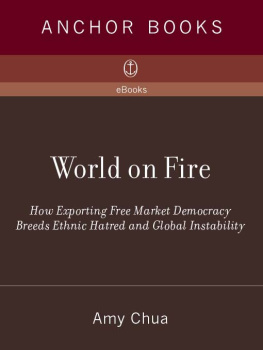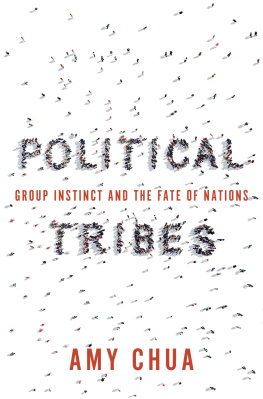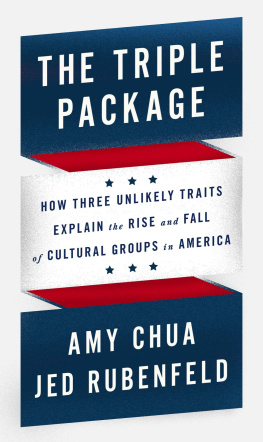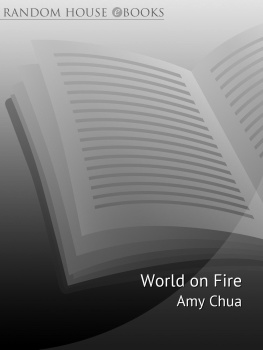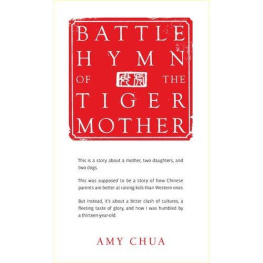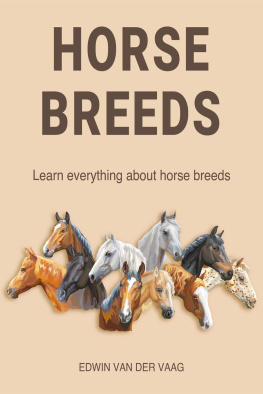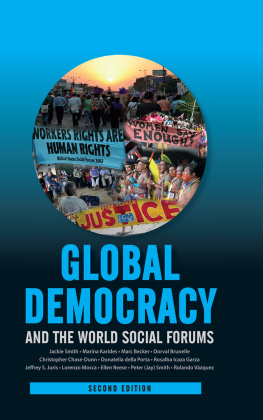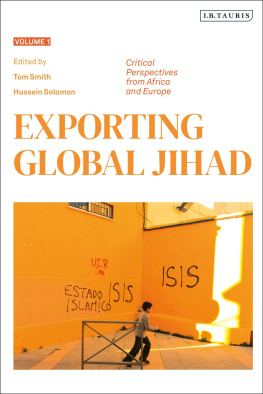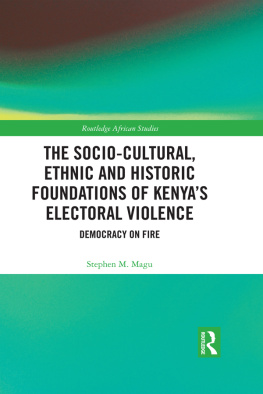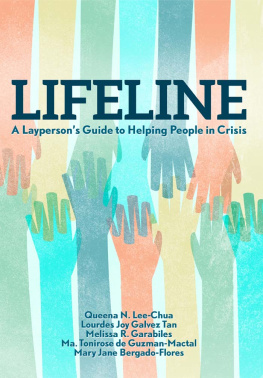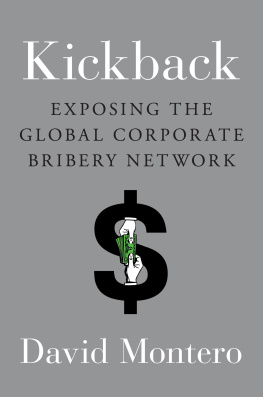Amy Chua - World on Fire: How Exporting Free Market Democracy Breeds Ethnic Hatred and Global Instability
Here you can read online Amy Chua - World on Fire: How Exporting Free Market Democracy Breeds Ethnic Hatred and Global Instability full text of the book (entire story) in english for free. Download pdf and epub, get meaning, cover and reviews about this ebook. year: 2004, genre: Politics. Description of the work, (preface) as well as reviews are available. Best literature library LitArk.com created for fans of good reading and offers a wide selection of genres:
Romance novel
Science fiction
Adventure
Detective
Science
History
Home and family
Prose
Art
Politics
Computer
Non-fiction
Religion
Business
Children
Humor
Choose a favorite category and find really read worthwhile books. Enjoy immersion in the world of imagination, feel the emotions of the characters or learn something new for yourself, make an fascinating discovery.
World on Fire: How Exporting Free Market Democracy Breeds Ethnic Hatred and Global Instability: summary, description and annotation
We offer to read an annotation, description, summary or preface (depends on what the author of the book "World on Fire: How Exporting Free Market Democracy Breeds Ethnic Hatred and Global Instability" wrote himself). If you haven't found the necessary information about the book — write in the comments, we will try to find it.
World on Fire: How Exporting Free Market Democracy Breeds Ethnic Hatred and Global Instability — read online for free the complete book (whole text) full work
Below is the text of the book, divided by pages. System saving the place of the last page read, allows you to conveniently read the book "World on Fire: How Exporting Free Market Democracy Breeds Ethnic Hatred and Global Instability" online for free, without having to search again every time where you left off. Put a bookmark, and you can go to the page where you finished reading at any time.
Font size:
Interval:
Bookmark:
Acknowledgments
I am grateful to many people for their contributions to this book, but my greatest debt by far is to my husband Jed Rubenfeld, who for a decade has read every word Ive written. I am the fortunate beneficiary of his kindness and genius.
I am also deeply grateful to a number of friends and professional colleagues. Strobe Talbott and Russell Pittman both read earlier drafts of the manuscript in its entirety and gave me tremendously helpful criticisms and suggestions. Others who provided invaluable comments on particular chapters include Bruce Ackerman, Yochai Benkler, Owen Fiss, Or Gozani, Jonathan Hecht, Donald Horowitz, Martin Michael, Elchi Nowrojee, Jeff Powell, George Priest, Susan Rose-Ackerman, Jennifer Roth-Gordon, David Steinberg, Alan Tan, and especially Amalia Anaya, Gonzalo Mendieta, and Jorge Patio, who tried valiantly to correct my North American misconceptions. Errors, of course, are mine alone.
Many research assistants devoted dozens, in some cases hundreds, of hours to this book. In particular, I would like to thank Ivana Cingel, Alana Hoffman, David Penna, Rory Phimester, Lara Slachta, Brent Wible, and especially Jason Choy, who amazed me with his dedication and willingness to help at all hours. The following former students also provided extremely helpful assistance and often local expertise: Migai Akech, Homayoon Arfazadah, Hubert Baylon, Jennifer Becker, Jennifer Behr, Ikenna Emehelu, Jeff Federman, Ben Hance, Lidia Kidane, Nimrod Kozlovski, Bianca Locsin, Toni Moore, Gonzalo Zegarra Mulanovich, Christina Owens, Caio Mario da Silva Pereira Neto, Tom Perriello, Emily Pierce, Uzi Rosha, Damian Schaible, Bill Scheffer, Daniel Sheridan, Saema Somalya, Suchon Tuly, Anders Walker, Kanchana Wang, and Tammy Zavaliyenko.
Many individuals were interviewed for this book, and I am thankful to them for their time and frankness. In most cases I have changed their names and other identifying factors to protect their anonymity.
This book is based on three earlier academic articles of mine: The Paradox of Free Market Democracy: Rethinking Development Policy, Harvard International Law Journal 41 (2000): 287379, Markets, Democracy, and Ethnicity: Toward a New Paradigm for Law and Development, Yale Law Journal 108 (1998): 1107, and The Privatization-Nationalization Cycle: The Link Between Markets and Ethnicity in Developing Countries, Columbia Law Review 95 (1995): 223303. I could not have written those articles without the friendship, support, and generosity of Dean Pamela Gann and Dean Katharine Bartlett of the Duke Law School and Dean Anthony Kronman of the Yale Law School.
Gene Coakley of the Yale Law School Library awed me with his energy and resourcefulness and has my great admiration and gratitude. I would also like to thank Miriam Abramowitz, Nicole Dewey, Frances Hamacher, and Patricia Spiegelhalter for their assistance and encouragement.
My love and thanks to Sophia and Louisa Chua-Rubenfeld for their patience and insights and for being my antidotes to despair.
Finally, I am deeply indebted to my agents Glen Hartley and Lynn Chu for believing in this project and to my brilliant editor, Adam Bellow.
Afterword to the Anchor Edition
I n March 2003, three months after the publication of World on Fire, the United States went to war with Iraq, commencing our preemptive strike with the awesome bombing of Baghdad. We went to war without United Nations authorization and without the support of traditional NATO allies such as France, Germany, and Canada. Of the major European powers, Great Britain alone, led by Tony Blair, fought beside us.
The U.S. governments principal justification for war was national securityspecifically Saddam Husseins sponsorship of terrorism and the grave danger to global peace and security posed by Iraqs massive stockpile of biological and chemical weapons and its efforts to produce nuclear weapons. At the same time, an equally powerful sub-themeformally laid out in The National Security Strategy of the United States of America issued by the White House in September 2002was the U.S. governments commitment, including through military means, to replacing brutal, repressive dictators like Saddam Hussein with free market and democratic institutions. According to the Strategy, We will actively work to bring the hope of democracy, development, free markets, and free trade to every corner of the world. And in his March 31, 2003 Letter to the Speaker of the House of Representatives, President George W. Bush explained that disarming and liberating Iraq was merely a first step toward the development of a free market democracy in Iraq.
The U.S.-British victory in Iraq was swift and decisive. Despite Saddam Husseins bizarre claims that The enemy... is in trouble now and Victory will soon be ours, his reviled Baathist regime fell in just over forty days, prompting dancing and cheeringnot to mention lootingthroughout Iraqi streets. Since that initial jubilation, however, one thing has become painfully clear: The United States dramatically underestimated the difficulty of turning Iraq into a liberal, Western-style free market democracy.
Before the war, optimists (including Secretary of Defense Donald Rumsfeld) pointed to American successes in reconstructing post-Second-World-War Germany and Japan, both of which transitioned smoothly to free market democracy. But neither postwar Germany nor Japan is an apt comparison for Iraq, for one simple reason: Neither country was riven by ethnic, religious, or tribal schisms remotely comparable to those of Iraq. By 1945, Germany had exterminated most of its non-Aryans and Japan had for centuries been strikingly ethnically and religiously homogeneous. Unfortunately, a far better parallel for post-Saddam Iraq is post-Tito Yugoslavia.
Like the former Yugoslavia, Iraqs ethnic and religious dynamics are extremely complicated. They involve cross-cutting conflicts across Kurds, Shias, Christians, and Sunnis; many horrendous massacres; wholesale confiscations; and deep feelings of hatred and need for revenge. In particular, Iraqs Shias represent a 60 percent long oppressed majority in Iraq. It is impossible to know what kind of candidatefundamentalist or moderate, conciliatory or vengefulthey would vote for in free elections. It is clear that the collapse of Saddam Husseins brutal (but secular) Baathist police state, while long overdue, has also fueled religious demagoguery among vying Islamic clerics and unleashed powerful fundamentalist movements throughout the country. Needless to say, these extremist movements are intensely anti-American, anti-foreign- investment, and illiberal. They have especially grievous implications for girls and women.
Perhaps because of beliefs in the melting pot and the United Statess own relatively successfulthough halting and incomplete history of ethnic assimilation, Americans dont always understand the significance of ethnicity, both in the United States and especially in other countries. Interestingly, British colonial governments were fastidiously conscious of ethnic divisions. Of course, their ethnic policies are a dangerous model. When it was the British Empires turn to deal with nation-building and ethnicity, the British engaged in divide-and-conquer policies, not only protecting but favoring ethnic minorities, and simultaneously aggravating ethnic resentments. As a result, when the British decamped, the time-bombs often exploded, from Africa to India to Southeast Asia. By contrast, at least before the war, the U.S. governments ethnic policy for Iraq was essentially to have no ethnic policy. Instead, U.S. officials seemed strangely confident that Iraqs ethnic, religious, and tribal divisions would dissipate in the face of democracy and market-generated wealth. In President George W. Bushs words, freedom and democracy will always and everywhere have greater appeal than the slogans of hatred.
Next pageFont size:
Interval:
Bookmark:
Similar books «World on Fire: How Exporting Free Market Democracy Breeds Ethnic Hatred and Global Instability»
Look at similar books to World on Fire: How Exporting Free Market Democracy Breeds Ethnic Hatred and Global Instability. We have selected literature similar in name and meaning in the hope of providing readers with more options to find new, interesting, not yet read works.
Discussion, reviews of the book World on Fire: How Exporting Free Market Democracy Breeds Ethnic Hatred and Global Instability and just readers' own opinions. Leave your comments, write what you think about the work, its meaning or the main characters. Specify what exactly you liked and what you didn't like, and why you think so.

